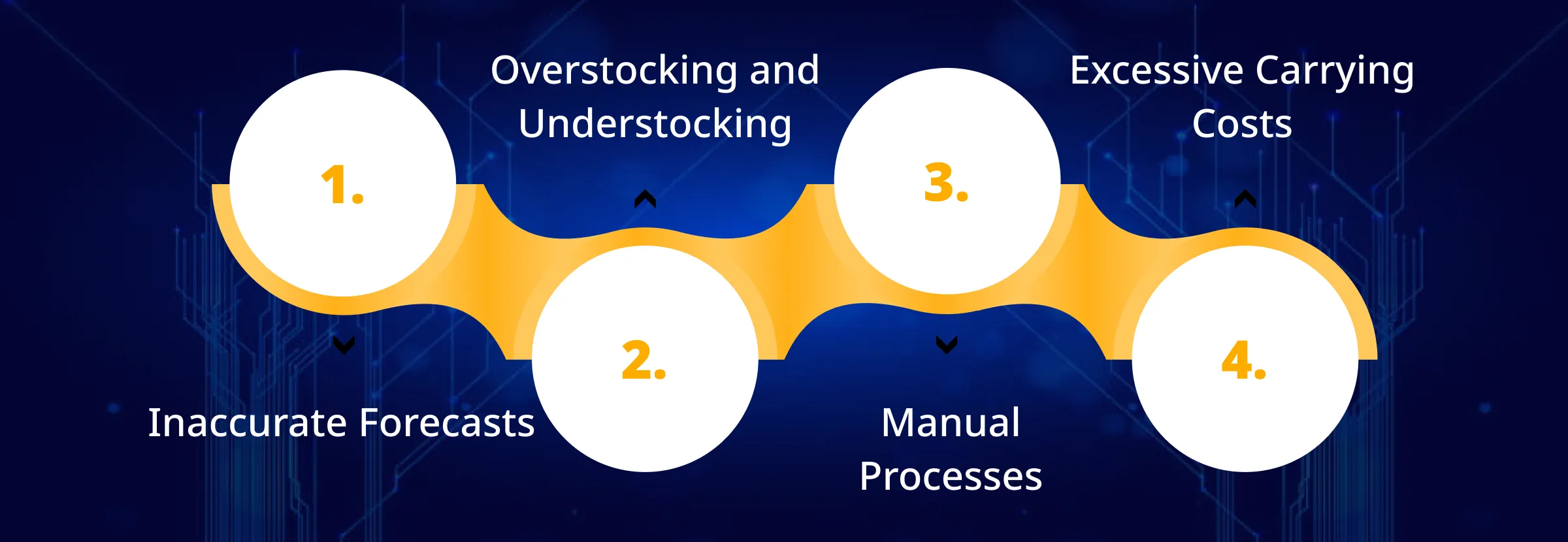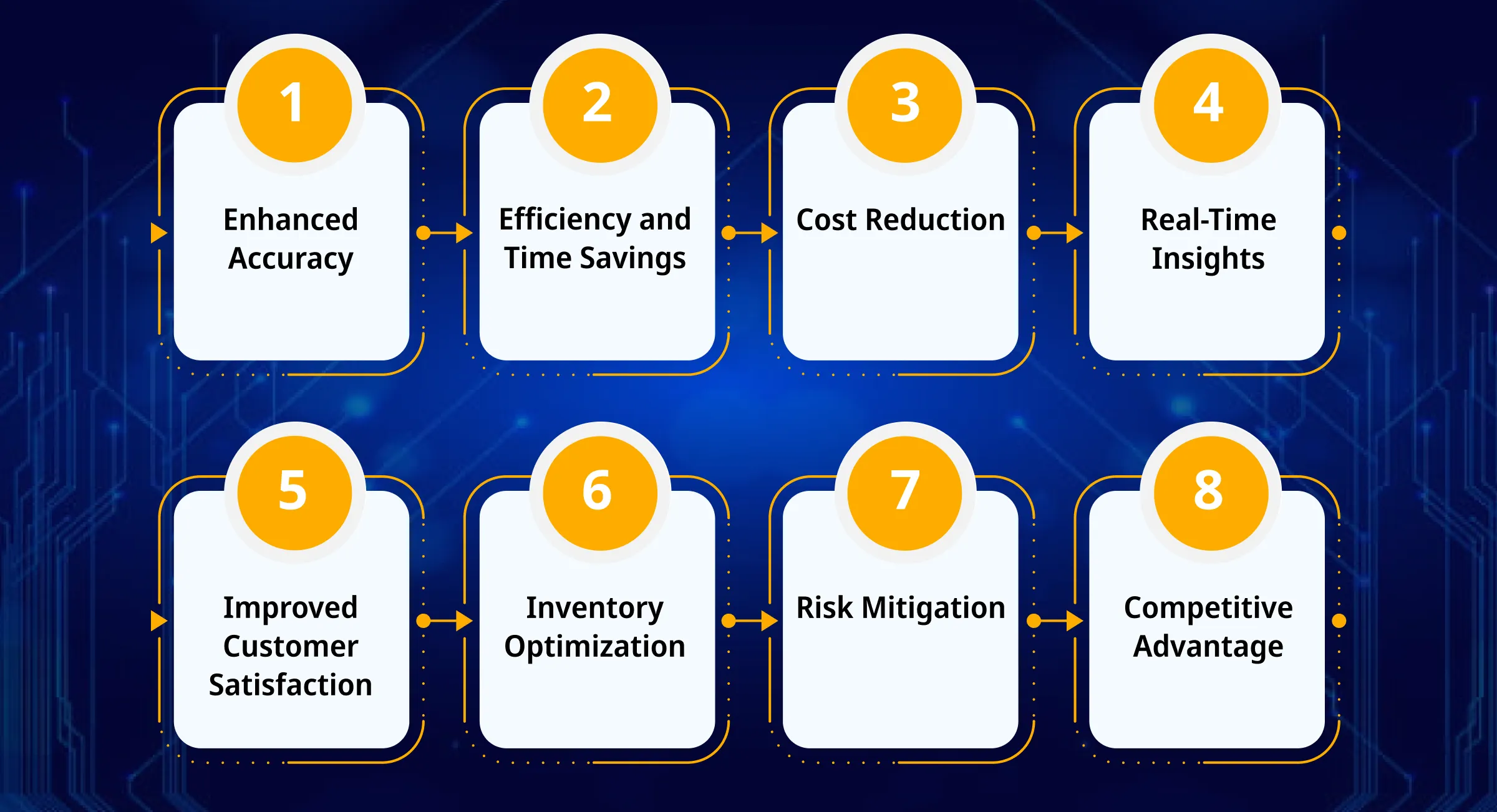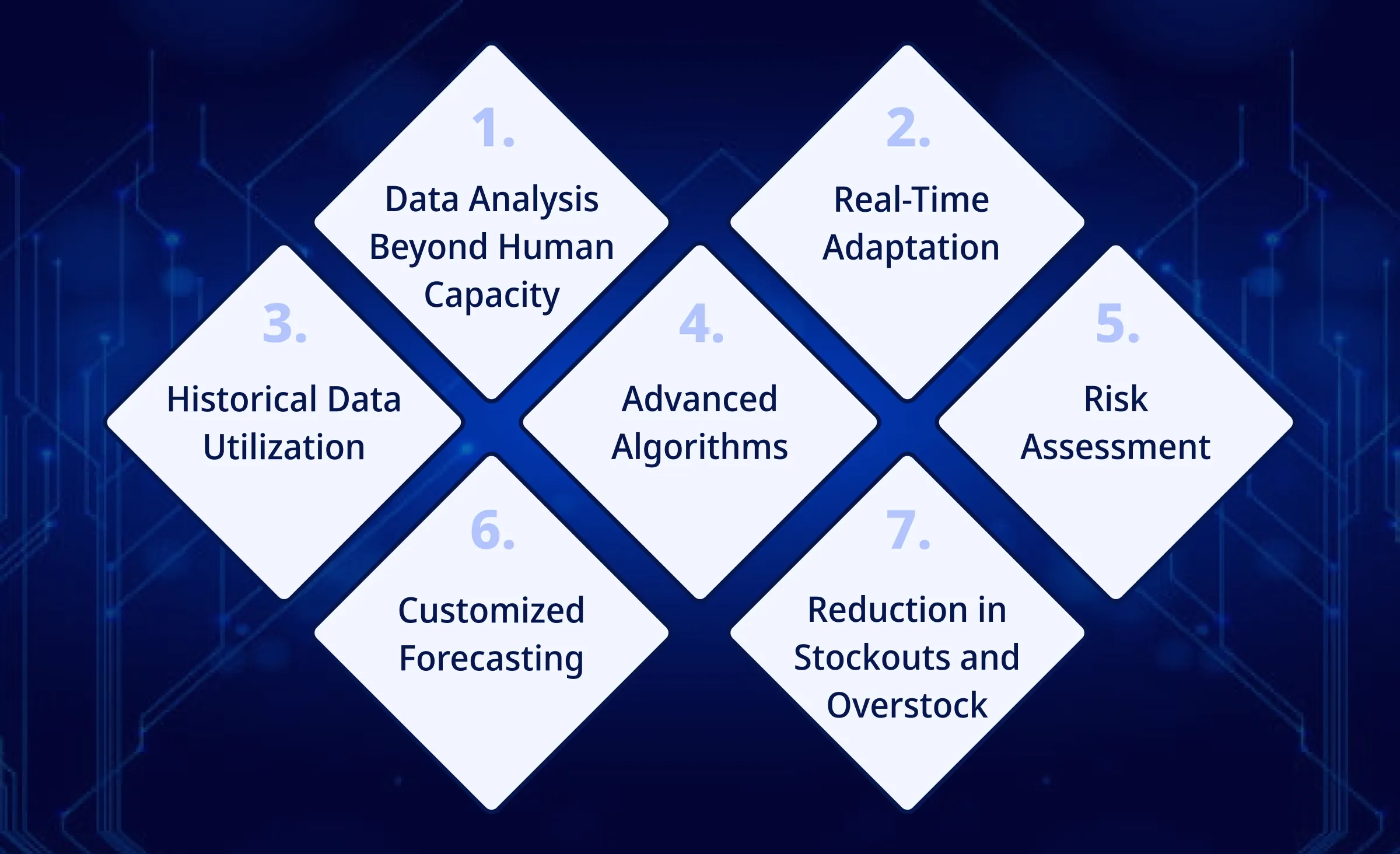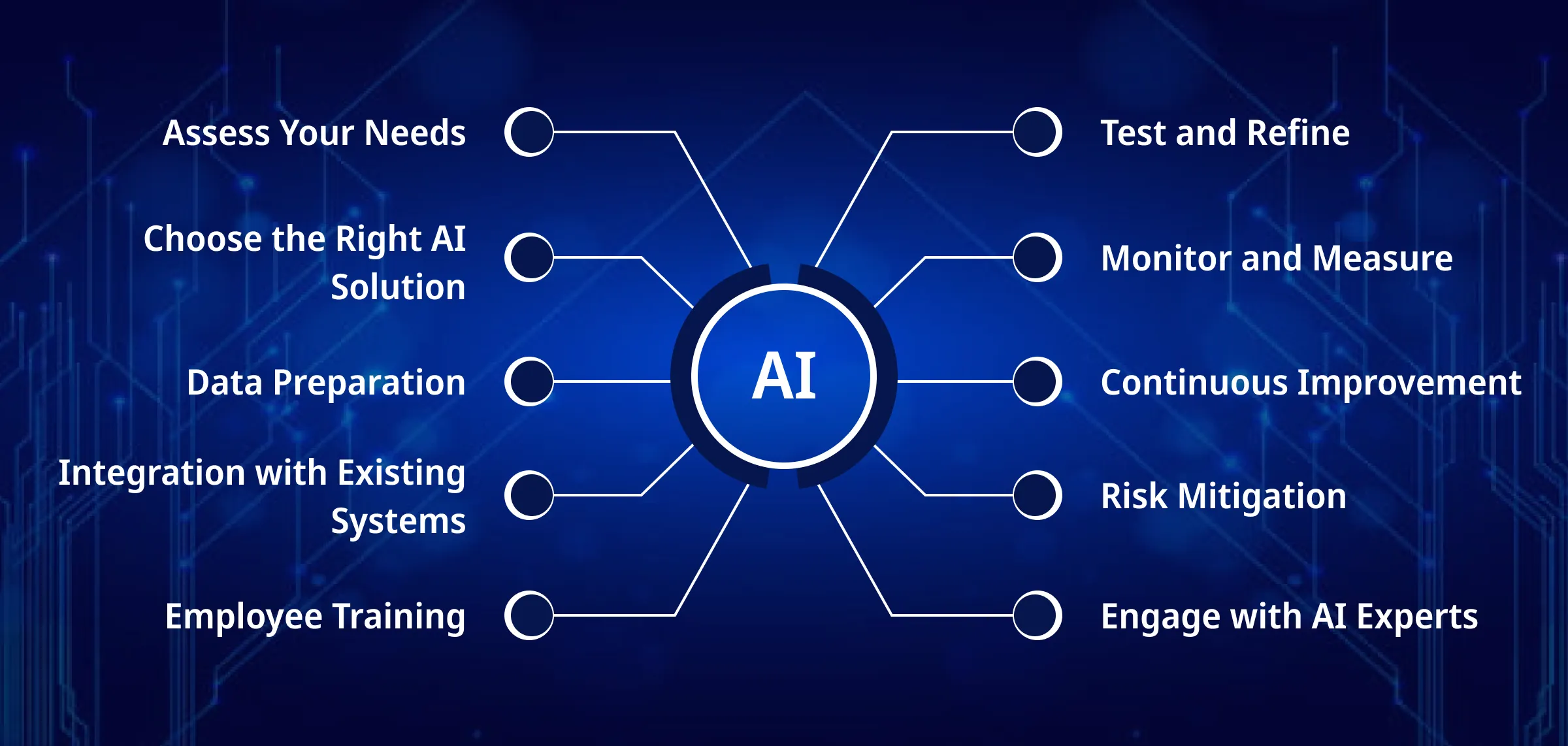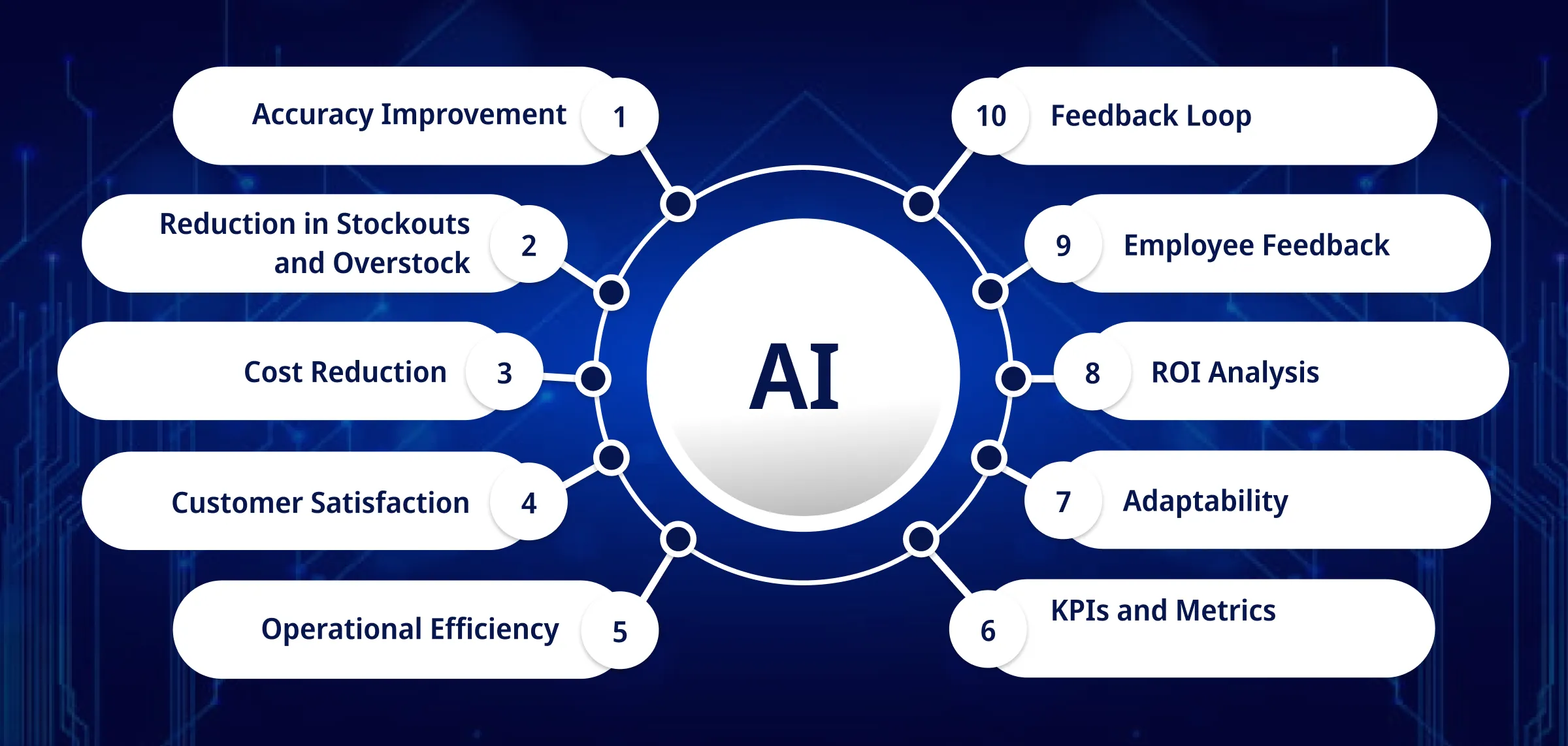Have you ever wondered how some businesses keep their shelves perfectly stocked, never overstocking or understocking, and always precisely meeting customer demand?
It’s not magic; it’s the power of AI in inventory management.
In a world where inventory mismanagement can cost businesses a staggering $1.1 trillion annually due to overstocking, understocking, and inefficient forecasting, the question isn’t whether you can afford AI; it’s whether you can afford to be without it.
Yes, you read that right – a colossal $1.1 trillion! (Source: Statista)
Let’s embark on a journey into the future of inventory management, where AI is the compass guiding us towards smarter, more accurate forecasting and efficient inventory handling.
Whether you are tired of:
- Costly stock-outs
- Disgruntled customers
- Lost revenue
Let us help you unlock the true potential of artificial intelligence in inventory management and learn how it can revolutionize your business operations and profitability.
Pain of Traditional Inventory Management and AI’s Solution
Traditional inventory management is like navigating a ship through turbulent waters blindfolded. The pain points are evident, and the consequences can be crippling for businesses.
Let’s delve into traditional inventory management’s challenges and how AI’s introduction in inventory management can alleviate them.
Inaccurate Forecasts: Traditional methods often rely on historical data, making adapting to dynamic market changes and unforeseen events difficult.
AI leverages machine learning algorithms to analyze vast datasets in real time, enabling businesses to make highly accurate demand forecasts. It adapts to changes and makes predictions that humans might overlook.
Overstocking and Understocking: Without the analytical power of AI, businesses tend to overstock, tying up valuable capital, or understock, resulting in lost sales and frustrated customers.
AI optimizes inventory levels by factoring in seasonality, market trends, and historical data, ensuring that businesses always maintain the right amount of stock.
Manual Processes: Manual data entry and spreadsheet-based management are error-prone, time-consuming, and leave little room for proactive decision-making.
AI automates repetitive tasks and eliminates manual errors, enhancing the efficiency of inventory management application processes. This frees up time for strategic decision-making.
Excessive Carrying Costs: Maintaining surplus inventory leads to higher warehousing and carrying costs, eating into profits.
With AI’s ability to fine-tune inventory management, carrying costs is minimized. Businesses can invest capital in growth rather than excess stock.
By embracing AI in inventory management, businesses can bid farewell to the pains of traditional methods. It’s a transformation that not only enhances efficiency but also improves customer satisfaction and financial well-being. With AI, you gain a competitive edge in a rapidly evolving marketplace.
Revolutionize your inventory management with ValueCoders!
Benefits of AI in Inventory Management
Artificial Intelligence in inventory management has many advantages, transforming how businesses handle their stock and ensuring they stay ahead in a competitive marketplace. Here are some key benefits:
- Enhanced Accuracy: AI excels at data analysis, reducing forecasting errors and ensuring that your inventory levels align precisely with customer demand. This enhanced accuracy means fewer stockouts and less wastage.
- Efficiency and Time Savings: With AI automating many inventory-related tasks, employees can focus on more strategic activities. This efficiency not only saves time but also cuts labor costs.
- Cost Reduction: AI helps optimize inventory levels, reducing carrying costs and freeing up capital that can be reinvested in growth initiatives.
- Real-Time Insights: AI provides real-time insights into inventory performance, allowing businesses to make data-driven decisions promptly. This is invaluable in a market where change happens rapidly.
- Improved Customer Satisfaction: Accurate forecasting and optimal stock levels mean you can consistently meet customer demands. This boosts customer satisfaction, loyalty, and repeat business.
- Inventory Optimization: AI helps businesses analyze data to identify trends, seasonality, and customer preferences. This information allows for better inventory planning and management.
- Risk Mitigation: AI can help identify potential supply chain automation solutions risks, such as disruptions or quality issues, allowing for proactive mitigation strategies.
- Competitive Advantage: Adopting AI in inventory management sets you apart from competitors, still relying on traditional methods. It positions your business as forward-thinking and better equipped to thrive in a dynamic market.
Incorporating AI into your inventory management processes isn’t just about keeping up with the times; it’s about gaining a significant advantage. The benefits are clear: greater accuracy, efficiency, cost savings, and ultimately, happier customers and a healthier bottom line.
Also Read: Revolutionizing The Drive: How Generative AI Is Shaping Automotive
The Power of AI in Accurate Forecasting
When it comes to forecasting demand and staying ahead in the game of inventory management, the power of AI is nothing short of transformative. Here’s how AI in inventory management excels in ensuring precise forecasts:
- Data Analysis Beyond Human Capacity: AI can analyze vast datasets at a speed and depth that humans simply can’t match. A data analytics services company can identify subtle patterns, correlations, and anomalies, allowing for more accurate forecasts.
- Real-Time Adaptation: The business landscape is constantly in flux. AI can adapt to real-time market conditions, events, and customer preferences, ensuring your forecasts remain current.
- Historical Data Utilization: While traditional methods might rely on limited data history, AI can consider a comprehensive historical dataset, including long-term trends and seasonality, leading to more reliable predictions.
- Advanced Algorithms: AI employs sophisticated machine learning algorithms that continually improve accuracy. As you use AI, your forecasting becomes more precise.
- Risk Assessment: AI not only predicts demand but also assesses potential risks in the supply chain, such as disruptions or delays. This enables proactive measures to be taken to mitigate these risks.
- Customized Forecasting: AI can be tailored to the specific needs of your business. It adapts to the nuances of your industry, product range, and customer base, providing highly customized forecasting solutions.
- Reduction in Stockouts and Overstock: Accurate forecasting reduces the chances of stockouts and overstock situations. This means you’re meeting customer demand efficiently and minimizing carrying costs.
AI-driven inventory management unlocks precision, efficiency, and profitability to the fullest!
AI in inventory management isn’t just about prediction; it’s about precision. It empowers businesses to make data-driven decisions, resulting in optimal inventory levels, improved customer satisfaction, and a competitive advantage. With AI, accurate forecasting is not a goal; it’s a reality.
Implementing AI in Your Inventory Management
You’re convinced that artificial intelligence in inventory management is the path to your business’s brighter, more efficient future. But how do you make this transformation a reality?
Let’s explore the steps to implement AI in your inventory management system effectively:
- Assess Your Needs: Start by assessing your current inventory management processes. Identify pain points, areas for improvement, and specific goals you want to achieve with AI.
- Choose the Right AI Solution: Research and choose an AI solution that aligns with your business requirements. Consider factors such as scalability, customization, and integration capabilities.
- Data Preparation: Gather and clean your data. AI’s power relies on high-quality data, so ensure your historical data is accurate and ready for analysis.
- Integration with Existing Systems: Work with your chosen AI solution provider to seamlessly integrate AI into your inventory management systems. This integration should maintain your daily operations.
- Employee Training: Provide training to your team to ensure they can effectively use AI tools. This step is essential to maximize the benefits of AI in your inventory management.
- Test and Refine: Begin using AI for forecasting and inventory optimization, but start with a smaller scope. Monitor the results, adjust, and gradually expand AI’s role in your processes.
- Monitor and Measure: Implement key performance indicators (KPIs) to measure the impact of AI on your inventory management. Regularly monitor these metrics to ensure AI is delivering the expected benefits.
- Continuous Improvement: AI is not a one-time implementation; it’s an ongoing process. Continuously refine your AI models and strategies to adapt to changing market dynamics.
- Risk Mitigation: Develop contingency plans for potential issues like system failures or data breaches. Being prepared is essential to maintain smooth operations.
- Engage with AI Experts: Maintain a line of communication with AI experts and your solution provider for ongoing support and guidance.
Remember, successfully implementing AI in inventory management is a journey, not a destination. It requires careful planning, commitment, and a willingness to adapt.
But the rewards are substantial – improved forecasting, cost savings, and a competitive edge in a fast-moving market. Embrace AI with confidence and watch your inventory management soar to new heights.
Measuring the Success of AI Implementation
Implementing AI development solutions in inventory management is a strategic move that demands careful evaluation. How do you determine if AI is genuinely making a difference?
Let’s explore the key ways to measure the success of AI implementation in your inventory management system:
- Accuracy Improvement: Start by analyzing the accuracy of your demand forecasts before and after AI implementation. You should see a noticeable improvement in the precision of your predictions.
- Reduction in Stockouts and Overstock: Measure how frequently stockouts and overstock situations occur. A successful AI implementation should result in a significant reduction of these costly incidents.
- Cost Reduction: Calculate the difference in carrying costs before and after AI. AI in inventory management should lead to cost reductions due to optimized inventory levels.
- Customer Satisfaction: Gather feedback from customers to assess their satisfaction levels. AI’s impact on order fulfillment and product availability should reflect positively in customer feedback.
- Operational Efficiency: Analyze the efficiency of your inventory management processes. AI should streamline operations, reduce manual work, and improve overall efficiency.
- KPIs and Metrics: Develop and monitor key performance indicators (KPIs) specific to your business. These metrics should provide insights into the success of AI implementation.
- Adaptability: Evaluate how well AI adapts to changing market conditions. AI should demonstrate the ability to make real-time adjustments to demand forecasts.
- ROI Analysis: Calculate your AI implementation’s return on investment (ROI). This should consider the cost of implementing AI and the resulting benefits, such as increased revenue and reduced costs.
- Employee Feedback: Solicit feedback from your employees who work with AI-powered inventory management tools. Their insights can provide valuable information on AI’s impact on their work.
- Feedback Loop: Establish a feedback loop to assess and refine the AI implementation continually. Regularly review performance and make adjustments as required.
Measuring the success of AI development services in inventory management is not a one-time endeavor; it’s an ongoing process. You can ensure that AI remains a valuable asset in your inventory management toolkit by continuously assessing its impact on accuracy, cost savings, customer satisfaction, and operational efficiency.
We empower your success from precision forecasting to streamlined operations!
Use Cases of AI in Inventory Management
AI in inventory management isn’t a theoretical concept; it’s a real-world game-changer. Let’s explore some use cases where businesses leverage AI to revolutionize their inventory management processes and ensure customer satisfaction.
ValueCoders’ Inventory Management Portal:
One remarkable case study involves ValueCoders’ development of an Inventory Management Portal. This platform serves as a global marketplace where sellers can efficiently manage and sell their products, and consumers have the power to compare goods for price and quality.
The emphasis here is on consumer satisfaction, with a unique feature that allows them to generate order requests with self-desired quality. The technology stack behind this success story includes Android, Angular, Ionic, IOS, MongoDB, and Nodejs.
It showcases how AI in inventory management can transform e-commerce platforms to prioritize customer satisfaction and streamline operations.
Walmart:
Retail giant Walmart utilizes AI and machine learning development in inventory management to optimize stock levels and enhance supply chain operations. AI algorithms analyze sales data, trends, and external factors to predict demand accurately, reducing overstock and understock situations.
Amazon:
Amazon’s fulfillment centers employ robots powered by AI to manage inventory efficiently. These robots move shelves to workers, helping them pick items for customer orders more quickly and accurately.
Zara:
The fashion retailer Zara uses AI in inventory management to analyze customer preferences and trends. This information helps produce clothing collections that align with customer demands, reducing the risk of unsold inventory.
IBM Watson:
IBM Watson’s AI-driven platform offers real-time inventory and supply chain management solutions operations visibility. It predicts potential disruptions, enabling businesses to take proactive measures.
Alibaba:
A global e-commerce giant, Alibaba relies on AI for demand forecasting and inventory optimization. This approach ensures that sellers can meet customer demands efficiently.
In these cases, AI in inventory management has transformed how businesses handle their stock, resulting in enhanced accuracy, efficient operations, and customer satisfaction.
These real-world examples demonstrate the practical and significant benefits of integrating AI into inventory management processes. As businesses continue to leverage AI, it becomes clear that the future of inventory management is increasingly intelligent, responsive, and customer-focused.
Also Read: How AI-Driven Analytics Is Shaping Mobile App Strategies In Real Estate
The Future of Inventory Management with AI
As we look ahead, it’s evident that the synergy between AI and inventory management will continue to evolve, shaping a smarter, more efficient, and customer-centric future.
- Advanced Forecasting: AI will only get better at forecasting customer demand. It will factor in a broader range of variables, from weather patterns to social media trends, to make almost uncannily accurate predictions.
- IoT Integration: The Internet of Things (IoT) will further enhance AI in inventory management. Smart sensors and devices will provide real-time data on inventory levels, making the system more responsive.
- Predictive Maintenance: AI will not only predict demand but also the health of equipment in the supply chain. This will lead to proactive maintenance, reducing downtime and disruptions.
- Personalization: Inventory management will become more personalized. AI will allow businesses to tailor their inventory to individual customer preferences, ensuring customers find what they want when they want it.
- Sustainability: AI will play a crucial role in sustainability efforts. By optimizing inventory, businesses can reduce waste and minimize their environmental impact.
- Globalization: With the help of AI, businesses will effortlessly manage inventory on a global scale. It will enable the seamless movement of goods across borders and efficient stock allocation.
- Marketplace Evolution: E-commerce and marketplace platforms will continue to evolve with AI. Enhanced recommendation systems and dynamic pricing will be standard features.
- Resilience: AI will help build resilient supply chains capable of withstanding unexpected disruptions and challenges, such as natural disasters or global crises.
The future of AI in inventory management is a future where businesses are responsive and predictive. They anticipate customer needs, make real-time decisions, and operate with a level of precision that was once unthinkable.
As we embrace this future, one thing is sure: AI isn’t just a tool; it’s a fundamental driver of success in the evolving world of inventory management.
AI-driven inventory management: shaping a smarter, customer-centric future!
Conclusion
In the dynamic world of inventory management, the choice is clear – embrace AI or risk the error.
AI in inventory management isn’t just a trend; it’s the future. AI is your key to success, with the power to accurately forecast demand, optimize stock levels, and enhance customer satisfaction.
So, don’t wait. Seize the opportunity to transform your inventory management, streamline operations, and gain a competitive edge.
Join the AI revolution with ValueCoders and witness the tangible benefits of more innovative, accurate inventory management. Embrace AI, and let it take your business to new heights.
Ready to Revolutionize Your Inventory Management? Get in Touch with Us Today!

